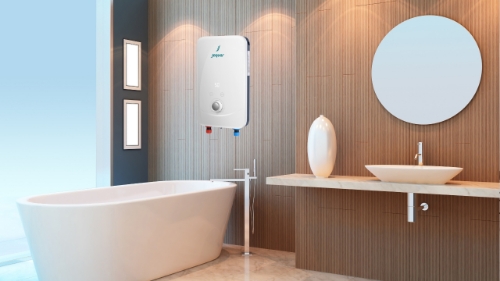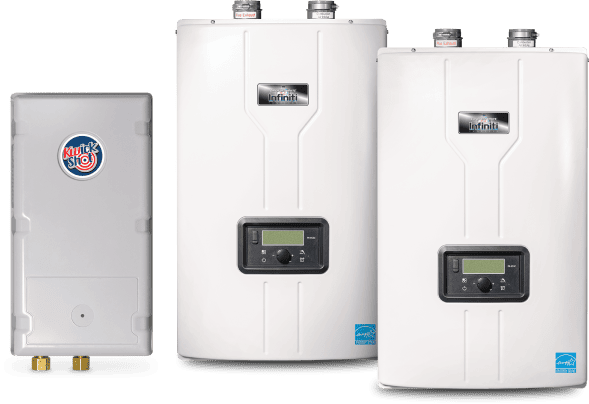What're your ideas concerning Six Benefits of a Tankless Hot Water Heater?

In a world where ease and efficiency reign supreme, it's not a surprise that home owners are regularly looking for smarter ways to handle their home's energy usage and comfort. One innovation that has steadily acquired popularity is the tankless hot water heater. However what exactly makes these systems stick out from the conventional tank-based designs a lot of us grew up with? Let's dive in and check out the advantages of tankless water heaters, assisting you choose if it's time to make the switch in your house.
Intro
Image this: you enter the shower after a lengthy day, expecting a comforting cascade of warm water, only to be welcomed by icy beads due to the fact that the last person used it all up. Sound acquainted? Traditional water heaters store a set quantity of warm water, indicating you're at the mercy of that container's supply. Tankless systems, on the other hand, warmth water as needed. Say goodbye to going out mid-shower, say goodbye to wrestling with timetables just to ensure hot water is available.
Understanding Tankless Water Heaters
What Are Tankless Hot Water Heater?
Tankless hot water heater, occasionally referred to as on-demand or immediate hot water heater, offer hot water only as it's required. Instead of saving gallons of pre-heated water, these devices kick into activity the moment you activate the faucet. Water goes through a warmth exchanger, warming up in real-time, implying you obtain a continuous flow of hot water without the requirement for a large storage tank sitting idly by.
How Do They Differ from Conventional Solutions?
Typical heating units hold a reservoir of hot water, utilizing power to maintain that storage tank at a consistent temperature. Tankless devices remove the standing supply, cutting down on wasted power and the bulky footprint of a big cyndrical tube. Basically, you're updating from a "accumulation" state of mind to a "made-to-order" strategy.
Usual Sorts Of Tankless Devices
Tankless hot water heater generally can be found in two varieties: gas and electrical. Gas designs tend to provide greater circulation rates, perfect for bigger households, while electric models typically offer smaller homes and are normally less complicated to install. Furthermore, some systems are made for point-of-use (offering one fixture) while others can deal with the entire home's warm water requirements.
Key Benefits of Tankless Hot Water Heater
1. Countless Hot Water Supply
Ever had to arrange showers so everyone gets their reasonable share of warm water? With tankless, that becomes a thing of the past. As long as the heating unit's flow capability isn't exceeded, you can take back-to-back showers without becoming a popsicle.
2. Power Performance and Price Savings
Say goodbye to warming a titan storage tank's well worth of water and keeping it cozy throughout the day. Tankless heaters minimize standby power losses, which can decrease energy bills. While the initial cost may be higher, the long-lasting financial savings commonly validate the financial investment.
3. Space-Saving Design
If your home is short on storage space, eliminating the large storage tank liberates valuable space. Tankless systems are compact and can often be mounted on walls, stashed in edges, or mounted in limited utility storage rooms without grabbing all of the entire space.
4. Longer Life expectancy
A properly maintained tankless hot water heater can outlast its tank-based relative. Typical containers might last 10-15 years, while tankless versions can maintain downing along for 20 years or even more, making them a solid financial investment gradually.
5. Improved Water Quality
Keeping water in a tank can often bring about debris buildup or a slightly "off" taste. With tankless systems, fresh water is heated up right away, decreasing the possibilities of sediment buildup and potentially supplying cleaner-tasting water.
Factors to consider Prior To Switching
Though the advantages are compelling, it's important to think about a few variables prior to fully committing.
Initial Investment Expenses
Tankless heating systems generally feature a higher upfront price. Between the device itself and potential setup adjustments, the preliminary price might offer you sticker shock. However remember to view it as a long-lasting financial investment.
Setup Requirements
Relying on your home's facilities, you may need added electric capacity or gas line upgrades. Guarantee you comprehend the installation requirements and talk to a specialist to prevent surprises.
Evaluating Your Home's Water Usage Patterns
If your household simultaneously makes use of multiple components with high warm water need, make certain the unit's flow price meets your demands. Understanding your usage patterns helps you pick the appropriate dimension and type of tankless heating unit.
Maintenance and Care Tips
Tankless systems are fairly low upkeep, however they aren't set-it-and-forget-it devices.
Normal Cleansing and Descaling
Hard water minerals can build up in the heat exchanger, affecting performance. Regular descaling (usually recommended each year) keeps the device performing at peak performance.
Yearly Professional Assessments
A yearly checkup from an expert guarantees small problems are caught early. They'll examine the unit's performance, look for leaks, and help keep optimal effectiveness.
Guaranteeing Proper Ventilation
For gas versions, correct ventilation is important to securely get rid of exhaust gases. Make sure airing vent systems are tidy and appropriately installed to prevent any kind of possible safety and security threats.
Contrasting Different Brands and Models
Not all tankless hot water heater are produced equal.
Researching Dependable Manufacturers
Seek credible brand names with a history of generating high quality devices. A reputable supplier often supplies far better consumer assistance and longer warranties.
Reading Testimonials and Individual Feedback
Individual reviews and comments from neighbors or buddies who have gone tankless can supply useful understandings. Often, real-life experiences can be more telling than advertising and marketing pamphlets.
Setup: Do It Yourself or Expert?
While some home owners enjoy taking on tasks themselves, tankless setup might not be the best time to break out the toolbox.
Advantages and disadvantages of DIY Installation
A do it yourself mount could save money, however it features risks. Inaccurate installment can cause inadequacy or security issues. If you come in handy and have experience, it may be practical-- yet wage care.
When to Call a Specialist Plumbing Technician
For many, calling a professional makes sure everything's done properly. An expert plumbing understands neighborhood codes, sizing requirements, and airing vent criteria, reducing the risk of mishaps.
Maximizing Performance
You have actually purchased a tankless device-- now optimize its effectiveness.
Optimum Temperature Settings
Lots of people establish their systems between 120-140 F. Changing the temperature can boost comfort and savings. Experiment to locate a wonderful place that does not throw away power.
Pairing with Low-Flow Fixtures
Wish to stretch your unit's capacities? Take into consideration setting up low-flow showerheads and faucets. They decrease water use, enabling your tankless system to supply a consistent stream of hot water without stressing.
Ecological Effect
Tankless water heaters straighten with greener living objectives.
Lowered Carbon Impact
By utilizing much less power and just heating water as required, tankless systems can decrease your home's carbon impact, reducing your ecological influence.
Conserving Natural Resources
Much less power intake and less squandered hot water translate into less natural deposits being used, an environmental win-win.
Who Profits The Majority Of from Tankless Heaters?
The beauty of tankless heating units is that they can suit a selection of families.
Big Households vs. Single Passengers
Large family members could like the countless hot water supply, while single residents appreciate the energy savings from not heating up a whole container for simply one person's early morning shower.
Home Owners with Restricted Room
If your home is short on square footage, shedding the bulky storage tank liberates room for other basics-- or possibly just much more elbow room.
Eco-Conscious Customers
Going tankless aligns with environmentally friendly values, ensuring you're not squandering energy or resources.
Future Patterns in Tankless Water Heaters
The world of home appliances is ever-evolving, and tankless water heaters are no exemption.
Smart Home Integration
Picture adjusting your water heater's temperature level through an application or receiving maintenance signals on your phone. As clever home technology developments, we'll see more connectivity and benefit.
Developments in Innovation
R&D is continuously improving warmth exchangers, making units extra effective and sturdy. Future models may be also quieter, much more portable, and much better matched for differing environments.
Conclusion
Selecting a tankless hot water heater is greater than just updating your home's warm water system; it's investing in long-term comfort, energy efficiency, and a greener lifestyle. By considering your home's water use, being mindful of setup needs, and committing to regular maintenance, you can take pleasure in a steady stream of warm water without the baggage of a bulky container. As modern technology develops, you can eagerly anticipate also smarter, a lot more effective tankless services that not just make your life less complicated however likewise profit the world.
Why You Should Consider a Tankless Water Heater for Your Home
Energy Efficiency and Cost Savings
Tankless water heaters, also known as on-demand water heaters, heat water only when needed. This means they don't waste energy keeping a tank of water hot constantly. This efficiency translates into substantial cost savings on your monthly energy bills.
Endless Hot Water Supply
One of the significant advantages of tankless water heaters is their ability to provide a continuous supply of hot water. Traditional tank water heaters have a limited capacity and can run out of hot water, especially during peak usage times. In contrast, tankless water heaters can provide an endless stream of hot water, making them ideal for larger families or homes with high water usage.
Space-Saving Design
Tankless water heaters are compact and take up significantly less space compared to traditional tank heaters. They can be installed on walls, under cabinets, or even outside, freeing up valuable space in your home. This makes tankless water heaters a great option for smaller homes or properties with limited space for a traditional water heater.
Longer Lifespan and Lower Maintenance
Tankless water heaters typically have a longer lifespan compared to traditional tank heaters. They can last up to 20 years or more with proper maintenance. Additionally, tankless systems are designed with replaceable parts, which can extend their lifespan further and reduce long-term maintenance costs.
Environmentally Friendly
Reducing energy consumption not only saves you money but also benefits the environment. Tankless water heaters contribute to a smaller carbon footprint by using less energy to heat water. Their energy efficiency and ability to minimize standby heat loss make them an eco-friendly choice for environmentally conscious homeowners.
Customized Temperature Control
Tankless water heaters offer precise temperature control, allowing you to set the desired temperature to meet your specific needs. This level of customization ensures you always have water at the perfect temperature for your comfort and usage requirements.
https://beantownservices.com/blog/consider-tankless-water-heater-for-your-home

I hope you enjoyed reading our article on Unveiling the Hot Trend: The Benefits of Tankless Water. Thanks so much for taking the time to read through our blog post. Sharing is nice. Helping people is fun. We take joy in reading our article about Six Benefits of a Tankless Hot Water Heater.
Get A Free Quote